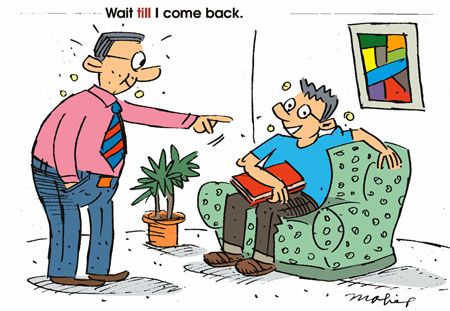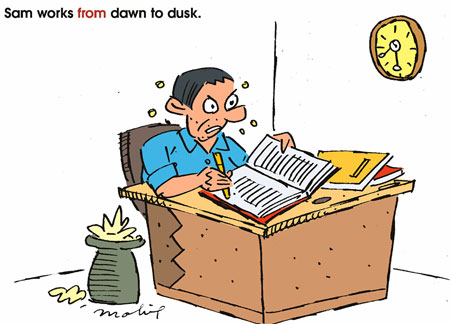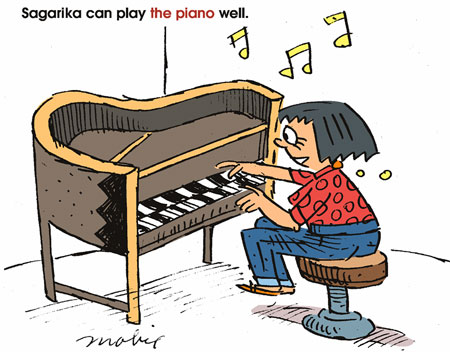|

by R. S. Karunaratne
Prepositions of time and duration
We use many prepositions to indicate time and duration.
To:

We use “to” when we want to point to an exact time before the stated
hour.The committee meeting was conducted at a quarter to seven.
A: What’s the time?
B: It’s ten (minutes) to five.
The train arrived late. It was a quarter to midnight when we returned
home.
It’s five (minutes) to seven. But the train hasn’t arrived.
From...to:
We use “from...to” to point to a period between the time when an
activity or event begins (from) and when it ends (to).
Clerks work from 8 a.m. to 5 p.m.
The museum is open from 9 a.m. to 5 p.m.
Sam works from dawn to dusk.
The film Titanic will be screened from 6 p.m. to 8.30 p.m.
Can you work from 6 a.m. to midnight without a break?
Teachers work from 7 a.m. to 2 p.m.Until
We use “until” to deal with a period of time but the focus is on when
the activity ends.
All the flights to Sri Lanka are fully booked until December.
Until 1980 we didn’t have television.
Do you wish to work until 60?
“Till” and “up to” have the same meaning as “until.” However, “till”
is more common in conversation.
Wait till I come back.
The patient kept me awake till midnight.
Up to 1996, the company paid an annual bonus to employees on
contract.
Up to the end of last month we had not received any applications for
the post of cashier.
At:
We use “at” to point to an exact time.
Please see me at 9 a.m.
He leaves home at 5.30 a.m.
The train arrives at 6.30 p.m.
The ceremony will begin at 10 a.m.

Between ... and :
We use “between ... and” to point out that an action takes place
after a stated time and before the second stated time.
The tourists will arrive between 10 a.m. and 12 noon.
We had heavy rains between March and May.
What are you doing between 7 a.m. and 8 a.m.?
For:
We use “for” to point to how long an activity, an event or a
situation continues or lasts.
My friend stayed with me for a month.
You should fast for 12 hours before going for a blood test.
We had to queue up for one hour to get our tickets.
Can you wait here for half an hour?
I waited for Sriyani for two hours.
Since:
We use “since” with an event of time in the past to point out that
the activity, event or situation is going on from that time on.
Zeta has been a journalist since the 1970s. (She is still a
journalist.)
I haven’t seen him since January this year.
Janitha has been in India since May.
[Activity]
Fill in the blanks with prepositions of time and duration (to, to,
from ... to, until, till, up to, at, between ... and, for, since)
Check your answers with the key.
1. It’s only two weeks ......... Christmas.
2. It’s ten ........ ten.
3. The canteen is open ....... 7 a.m ....... 3 p.m.
4. Mary was up ................ 3 a.m. thinking of the trip.
5. The customers waited .............. half past nine for your arrival.
6. ............... yesterday the police had no idea where the child was.
7. There is a meeting ......... 3 p.m. today.
8. All the shops will remain closed .............. 1 p.m. .............
2 p.m.
9. I’ll be out of the country .............. a few days.
10. It was the hottest month .............. records began.
Key:
1. to 2. to 3. from, to 4. until 5. till 6. Up to 7. at 8. between,
and 9. for 10. since
Know your idioms
English is particularly rich in idioms - those modes of expressions
peculiar to a language. Idioms frequently defy logical and grammatical
rules. However, without idioms, language would lose much of its vitality
and colour. Here are ten frequently used English idioms in the form of a
quiz. Underline the meaning of each idiom in bold type in the following
sentences. Check your answers with the key.
1. That’s an apology for a short story. Do it again!
(a) an example of poor quality
(b) something excellent
(c) an excuse
2. Wickram has no regular income but he buys expensive clothes in
order to keep up appearances.
(a) to impress others
(b) to hide the truth
(c) to show his importance
3. Sudharman’s expensive car proved to be an apple of discord.
(a) an attraction
(b) an item that needs a lot of attention
(c) something which causes jealousy and fighting
4. Nethmi is the apple of her grandfather’s eye.
(a) somebody disliked by someone
(b) somebody greatly loved by someone
(c) somebody who creates problems
5. Eva keeps her room in apple-pie order.
(a) empty
(b) in order
(c) neat and tidy
6. Are you still tied to your mother’s apron-strings?
(a) dependent on
(b) loved
(c) favour
7. Although the criminal moved to a remote village, the long arm of
the law soon arrested him.
(a) the army
(b) the police force
(c) the courts
8. Mary is up in arms about the manager’s decision to reinstate one
of the trouble-makers.
(a) indifferent
(b) very happy
(c) very angry
9. Zeta keeps lawless elements at arm’s length.
(a) avoids becoming too friendly
(b) makes friends
(c) forgives
10. The highwayman was not ready to lay down his arms.
(a) surrender
(b) run away
(c) fight
-------------
Key:
1. (a) 2. (b) 3. (c) 4. (b) 5. (c) 6. (a) 7. (b) 8. (c) 9. (a) 10.
(a)
Starters:
The definite article and its uses
We use the definite article “the” when it is clear which thing we
mean.
I’m going to clean the room tomorrow. (= my room)
I wrote to her several times but she never replied to the letters. (=
the letters I wrote)
We didn’t enjoy our holiday. The hotel was hopeless. (= our hotel)

Sri Jayewardenepura is the capital of Sri Lanka. (= there is only one
capital in Sri Lanka)
What is the smallest island in the world?
We use “the” to refer to things in a room, house or town.
Now he is going to paint the door.
The ceiling is new but it has to be painted.
Be careful! You might slip on the floor.
Don’t spill coffee on the carpet.
Switch on the light.
The roof is leaking.
The garden is overgrown with weeds.
Go to the kitchen and bring some water.
Grandmother slipped in the bathroom.
The cultural centre is close to the post office.
Give me a lift to the railway station.
How far is the airport from here?
There is a meeting at the Town Hall.
We use “the” when it is clear which thing or person we mean.
Kuala Lumpur is the capital of Malaysia.
What is the name of that girl?
Excuse me, where is the nearest police station?
Who is the President of India?
May I know the time, please?
Bobby’s new office is on the seventh floor.
We use “the” with “top” and “end.”
The end of the novel is somewhat boring.
My house is at the end of this lane.
He sat on the top of the boulder.
The top part of this dress is awful.
We use “the” with “same.”
This is the same man who stole my camera.
These children are not different. They are the same!
We use “the” with unique things.
The sun rises in the east and sets in the west.
Children love to look at the moon.
Many changes are taking place in the world.
Birds fly in the sky.
Some people want to live in the country.
We use “the” with “police, army, fire brigade, air force” and “navy.”
The police are looking for the suspects.
Do you like to join the army?
The fire brigade is doing a great service to the people.
Women also serve in the air force.
Are there women in the navy?
We use “the” with musical instruments.
Nethmi is learning to play the violin.
Sagarika can play the piano well.
I like to play the guitar.
We use “the” with “radio” but not with “television.”
Grandmother often listens to the radio.
Children love to watch television.
What’s on the radio now?
What’s on television now?
Turn off the television. (= the television set)
We do not use “the” with breakfast, lunch or dinner.
Some people never have breakfast.
When are you going for lunch?
We invited them for dinner.
[Activity]
Put in “the” where necessary and check your answers with the key.
1. ............. sky is blue and ............ sun is shining.
2. What are you going to have for ................. dinner?
3. My office is on ................ second floor of this building.
4. There’s a fire! Call ............. fire brigade.
5. Who was ................ first man to walk on .............. moon?
6. Which city is .............. capital of Sri Lanka?
7. What is ................ largest island in ................ world?
8. Do you want to join ................ navy?
9. We live near ................. sea.
10. We watch ................ television regularly.
Key:
The, the 2. ——- 3. the 4. the 5. the, the 6. the 7. the, the 8. the
9. the 10. ——
Spelling rules
The English language has a small number of rules that underpin how
words are spelt. Here are a few of them.
1. “Q” is always followed by “U.”quiet, quite, question, quality,
quantity, queue, quotient, quotation
Exception: Iraqi
2. “J” and “V” are followed by a vowel.page (“g” is sounded as “J”),
edge (“g” is sounded as “J”), forage (“g” is sounded as “J”), receive,
give, love, stove, dove
3. The consonants “B, C, D, F, G, L, M, N, P, R, S, T, and Z” are
doubled in the middle and at the end of words.robber, accident, added,
suffer, ragged, syllable, accommodate, runner, appointment, error,
possible, admitted, buzz
4. The consonants “H, J, K, Q, V, W, and X” are not doubled.mahout,
project, pocket, liquid, avoid, showed, laxity, improve, Exceptions:
withhold, bookkeeping, savvy, heartthrob
5. “A, I” and “U” do not come at the end of words.pay, tie, due
Exception: banana
6. “Content words” (describing things and actions) have at least
three letters.
buy, bee, inn, nod, bid, lid, kid
7. Extra letters are not found in “Non-content” words with similar
sounds.by, be, in
8. “I” comes before “E”, except after “C”. brief, chief, field,
niece, siege, thief, ceiling
Exceptions: caffein, surfeit, their, receive, deceit
9. The vowels (A, E, I, O, U) have a “short” sound when they appear
in short words.cat, rat, hat, men, pen, den, ten, bit, hit, sit, dot,
lot, got, but, nut, hut
10. When “E” is added to the end, the first vowel gives a long
sound.date, rate, hate, scene, swede, theme, bite, mite, like, note,
lone, mole, flute, rule, brute, route
Match the synonyms
Synonyms are words having similar meanings. Match the words in column
‘A’ with those in column ‘B’. Check your answers with the key.
[Column A]
1. blast
2. blatant
3. blaze
4. bleak
5. blend
6. blessed
7. blight
8. bling
9. blink
10. bliss
11. blister
12. blitz
13. bloc
14. block
15. blockade
16. blonde
17. bloom
18. blueprint
19. bluff
20. blunder
21. blunt
22. board
23. boast
24. bob
25. bogus
[Column B]
A. attack
B. boil
C. curse
D. dismal
E. explosion
F. fire
G. group
H. holy
I. fair
J. joy
K. flower
L. plan
M. mix
N. deception
O. obvious
P. piece
Q. mistake
R. frank
S. sightless
T. stoppage
U. plank
V. brag
W. wink
X. bounce
Y. fake
Key:
1. E 2. O 3. F 4. D 5. M 6. H 7. C 8. S 9. W 10. J 11. B 12. A 13. G
14. P 15. T 16. I 17. K 18. L 19. N 20. Q 21. R 22. U 23. V 24. X 25. Y |

